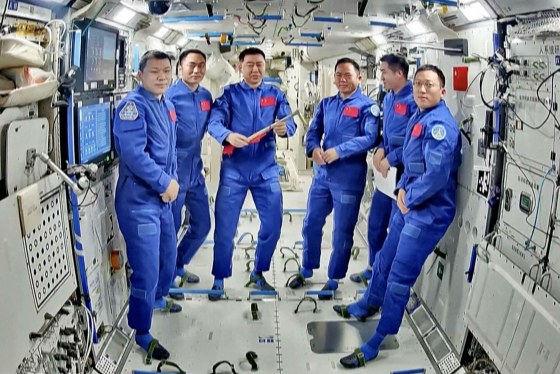BEIJING — Three Chinese astronauts returned from their nation’s space station Friday after more than a week’s delay because their original return capsule was damaged, likely from being hit by space debris.
The team left their Shenzhou-20 spacecraft in orbit and came back using the recently arrived Shenzhou-21 that had ferried a three-person replacement crew to the station, China’s Manned Space Agency said.
It was unclear whether the change in spacecraft would affect the timing of future missions to the Tiangong space station. The space agency said that Shenzhou-22 would be launched but did not specify when.
The return capsule deployed a red-and-white-striped parachute before coming down in the late afternoon at a remote site in northern China’s Gobi Desert, about five and a half hours after leaving the space station. The impact sent up a large cloud of dust in the barren landscape.
The astronauts — Chen Dong, Chen Zhongrui and Wang Jie — had been on a six-month rotation and were originally scheduled to return Nov. 5, four days after the new crew arrived.
Their return was delayed for nine days. The original return plan was scrapped because a window in the Shenzhou-20 return capsule had tiny cracks, most likely caused by impact from space debris, the space agency said Friday.
There are millions of pieces of mostly tiny debris circling the Earth at speeds faster than a bullet flies. They can come from launches and collisions and pose a risk to satellites, space stations and the astronauts who operate outside them.
The temporarily stranded astronauts, who had traveled to the space station in April, conducted experiments with the new crew and were “in good condition, working and living normally,” the agency said earlier this week.
China’s space program has made steady progress since 2003. Besides building its own space station, it has explored Mars with a robotic rover and aims to land a person on the moon by 2030.
China built the Tiangong space station after the country was excluded from the International Space Station over U.S. national security concerns. China’s space program is controlled by its military.
The Tiangong, which means “Heavenly Palace,” is smaller than the International Space Station.
The latest mission brought four mice to study how weightlessness and confinement would affect them. The study will help master key technologies for breeding and monitoring small mammals in space, an engineer from the Chinese Academy of Sciences said.
